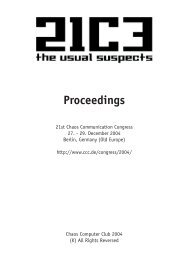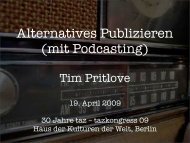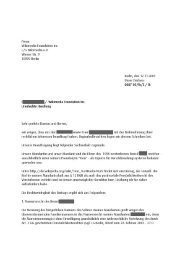Proceedings
Proceedings
Proceedings
You also want an ePaper? Increase the reach of your titles
YUMPU automatically turns print PDFs into web optimized ePapers that Google loves.
ACADEMIC TOOLS AND REAL-LIFE BUG FINDING IN WIN32<br />
scripts which will check each function separately, then check<br />
each function together with its callees and callers, etc etc.<br />
The problem is that CBMC sometimes requires huge amount<br />
of RAM even to process a single small function; some work is<br />
needed to minimize the memory requirements. Until this issue<br />
has been resolved, the implementation of checking multiple<br />
functions simultaneously is deferred.<br />
F. Statistics<br />
The target nwwks.dll binary has size 60688 bytes.<br />
On a machine with Pentium 4 2.4 GHz processor, UQBT<br />
generated 215 functions, totaling 661946 bytes of C code,<br />
in 20 seconds; maximum RAM usage reached 112 MB. The<br />
calling convention of 3 library functions had to be specified<br />
manually in order to finish decompilation without errors.<br />
For 60 LocalAlloc invocations, 132 assertions were generated;<br />
simplified semantics of two library functions had to be<br />
specified in order to check most of the assertions successfully.<br />
Afterwards, the run of the checker took ca 6 minutes, with<br />
top RAM usage at ca 700 MB; seven failed assertions were<br />
returned, among which three were caused by real bugs.<br />
VII. FUTURE WORK<br />
The most important short term goal is to modify the decompiler<br />
so that CBMC can check more pointer operations. To<br />
achieve this, probably some form of type information recovery<br />
should be implemented.<br />
Another two features can be implemented with little effort.<br />
Firstly, it should be possible to check for integer underflows<br />
in the ”size” argument to memcpy function, using techniques<br />
similar to the above. Secondly, checking for format string bugs<br />
should be simple - it is enough to check that the format<br />
argument is effectively a string constant (possibly passed<br />
through a few levels of function calls).<br />
A more challenging task would be to provide support for<br />
C++ code. The main problem is how to handle virtual function<br />
calls; it would be interesting to investigate in how many cases<br />
it is possible to deduce automatically what the type of an<br />
object is, and consequently which virtual function is called at<br />
a given place in the code.<br />
VIII. CONCLUSION<br />
This paper documents the current state of the UQBTng tool.<br />
Judging by the performed experiments, it is possible to detect<br />
exploitable integer overflow condition, while requiring little<br />
interaction from the user. Particularly, it appears that in order<br />
to receive good results, it is enough to specify semantics of<br />
only a few library function. Further development is needed to<br />
increase the tool’s capability of handling pointer dereferences<br />
of more complex data structures, but even currently the tool<br />
can be useful for a security researcher.<br />
REFERENCES<br />
[1] Cristina Cifuentes and others, UQBT,<br />
http://www.itee.uq.edu.au/˜cristina/uqbt.html<br />
[2] SANS Institute, The Twenty Most Critical Internet Security Vulnerabilities,<br />
http://www.sans.org/top20/<br />
[3] Bugtraq mailing list, http://www.securityfocus.com/archive/1<br />
[4] Junfeng Yang, Ted Kremenek, Yichen Xie, and Dawson Engler, MECA:<br />
an Extensible, Expressive System and Language for Statically Checking<br />
Security Properties, <strong>Proceedings</strong> of the 10th ACM conference on<br />
Computer and communication security (ACM CCS), 2003.<br />
[5] Immunity, Inc., Microsoft Windows: A lower Total Cost of 0wnership,<br />
http://www.immunitysec.com/downloads/tc0.pdf<br />
[6] Remotely exploitable integer overflow in openssh,<br />
http://www.openssh.com/txt/preauth.adv<br />
[7] Daniel Kroening, Bounded Model Checking for ANSI-C,<br />
http://www.cs.cmu.edu/˜modelcheck/cbmc/<br />
[8] DataRescue, Inc., The Interactive Deassembler,<br />
http://www.datarescue.com/idabase/index.htm<br />
[9] Rybagowa, Seven years and counting,<br />
http://www.lvegas.com/little cbtc proceedings/27 02 04.html<br />
[10] Microsoft Security Bulletin MS05-053,<br />
http://www.microsoft.com/technet/security/Bulletin/MS05-053.mspx<br />
[11] Microsoft Portable Executable and Common Object File Format Specification,<br />
www.microsoft.com/whdc/system/platform/firmware/PECOFF.mspx<br />
[12] Microsoft Security Bulletin MS05-046,<br />
http://www.microsoft.com/technet/security/Bulletin/MS05-046.mspx<br />
21 |






